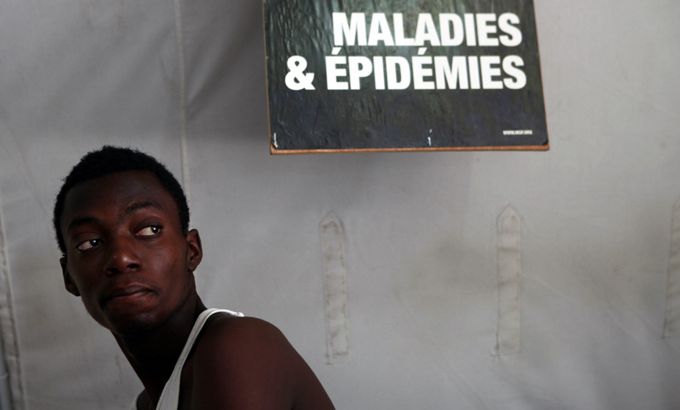
Is the UN repackaging Haiti’s cholera aid?
We ask what the new plan to eradicate cholera truly means when the UN still refuses to admit causing the outbreak.
The United Nations last week launched what it described as a new multi-billion dollar effort to eradicate cholera in Haiti, and the neighbouring Dominican Republic.
Haiti may have many problems but until 2010 cholera was not one of them. In fact, the country had no known history of the disease at all.
Keep reading
list of 4 itemsLost Futures
Photos: Greek valley that became a lake stirs drought debate
Botswana threatens to send 20,000 elephants to Germany
But that fact changed in October 2010, and in the 25 months since cholera has infected hundreds of thousands and killed close to 8,000 people.
|
“That’s [new plan] the same old stuff that they try to bring to Haiti, the same old stuff that has not been working. The UN knows fully-well that they are responsible for cholera in Haiti … In fact, if the UN were a country, Ban Ki-moon should have been in The Hague, in the jail cell for crimes committed against humanity.” – Jean Yves Point-du-Jour, a Haitian radio host |
Ban Ki-moon, the UN secretary-general, made the announcement, but it was subsequently pointed out that the plan is simply a repackaging of an already-existing programme that began nearly a year ago.
Critics say the plan is “purely aspirational”.
In addition, the UN is still refusing to admit that its peacekeeping troops from Nepal were the source of the outbreak in the first place, something that is even supported by UN-appointed scientists.
It was reported that the UN aimed to spend $2.2bn over the next 10 years, but hardly any of that money is available. The UN is contributing only $23.5m of new money, or one percent of the funds.
It was announced that the fund would receive $215m in donations from Spain, Japan, the World Bank and the Inter-American Development Bank.
But besides the $800,000 donated by Japan following Hurricane Sandy, all of that money had been previously pledged and is now being refashioned as money for what was billed as the new cholera initiative.
The UN has spent $118m responding to the cholera outbreak to date.
But this figure is a fraction of the $677m budgeted by the UN for its military operations in Haiti for 2012-2013.
|
“Unfortunately, not just with regard to this one crisis but in general we’re seeing the same old patterns emerging in development of money getting re-pledged over and over for the same things and promises being made that, if fulfilled, are going to be very important but … it’s hard to be optimistic.“ – Jonathan Katz, a journalist and author |
Nearly 620,000 Haitians have been stricken by the cholera outbreak, with thousands of new cases reported following Hurricane Sandy last month.
There have been widespread protests in Haiti over the UN’s role in the spread of the disease. In November last year, 15,000 Haitians banded together to file a complaint over the outbreak.
Rishi Rattan, the advocacy chair with Physicians for Haiti who briefs the UN on water infrastructure issues, told Al Jazeera: “In my work, behind the scenes at the UN, I’ve met many colleagues and allies that really want to work toward justice and accountability toward Haiti and its citizens but they have on many levels, I think at the secretariat, administrative and bureaucratic levels, been stymied in their efforts to be honest and work toward justice, and I think that’s been frustrating for everybody.”
So what should the UN do to help Haiti eradicate cholera?
Joining Inside Story Americas with presenter Shihab Rattansi for the discussion are guests: Jonathan Katz, a journalist who also wrote The Big Truck That Went By – a book about the failure of the international community to help Haiti; Brian Concannon, the director of the Institute for Justice and Democracy in Haiti; and Jean Yves Point-du-Jour, a Haitian radio host.
Al Jazeera’s invitation to several UN agencies to join the panel was declined.
|
“If [the UN plan] does get implemented it will address one of our three claims. We’re asking for three things – provision of water and sanitation necessary to control the epidemic, to stop the killing; compensation to [all victims] that have lost almost everything; an apology which hopefully will help make sure that this doesn’t happen again to another country.” Brian Concannon, the director of the Institute for Justice and Democracy in Haiti |